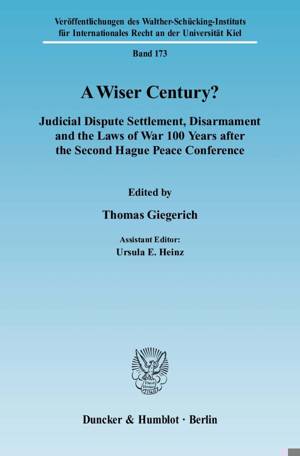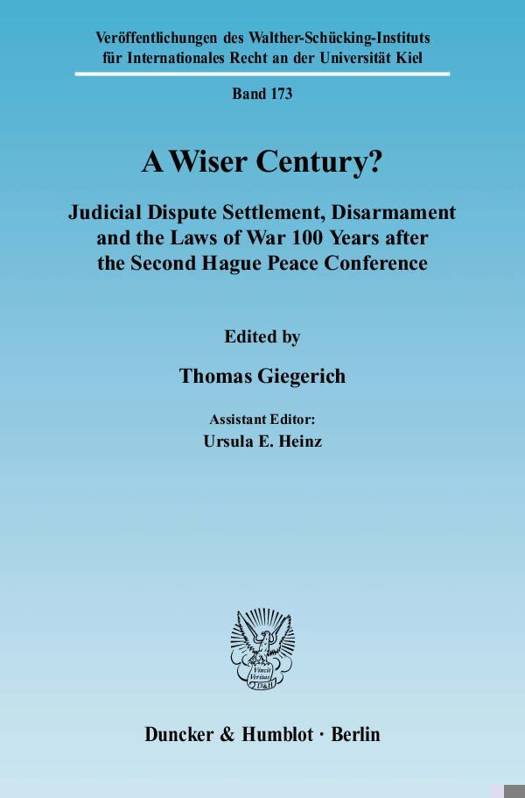
- Retrait gratuit dans votre magasin Club
- 7.000.000 titres dans notre catalogue
- Payer en toute sécurité
- Toujours un magasin près de chez vous
- Retrait gratuit dans votre magasin Club
- 7.000.0000 titres dans notre catalogue
- Payer en toute sécurité
- Toujours un magasin près de chez vous
A Wiser Century?
Judicial Dispute Settlement, Disarmament and the Laws of War 1 Years After the Second Hague Peace Conference
98,45 €
+ 196 points
Description
The Hague Peace Conferences of 1899 and 1907 dealt with three interlinked topics: the peaceful settlement of disputes, including by arbitration; the restriction of armaments and military budgets; the laws of war. The first two were aimed at preventing the outbreak of war, not by restricting the jus ad bellum in its substance, but by inducing states not to use their continuing war power and to limit the growth of their war machinery. The third topic was concerned with containing the brutality of war where its prevention had failed. Whereas the Conferences succeeded in codifying the laws of war, they made less progress with regard to the peaceful settlement of disputes and failed on limiting armaments. Worst of all, they could not prevent the outbreak of World War I.
This volume uses the occasion of the 100th anniversary of the Second Hague Peace Conference to follow up on the then concerns and objectives, looking at the Hague legacy through the lens of today's problems. The 27 contributions treat the most pressing recent issues of non-proliferation and disarmament, international humanitarian law and judicial dispute settlement. Three questions run like a thread through this volume: 1. In which areas have the promises of 1899 and 1907 remained unfulfilled and why? 2. In which areas has there been progress, in which other areas perhaps regression? 3. What are our prospects and how can we international lawyers help shaping a promising future in respect of the prevention and containment of war?
Whereas the "empire of law" in international relations and the age of international justice, which were envisaged in the Convention for the Pacific Settlement of International Disputes of 1899/1907, have not yet arrived on the global level, we Europeans have made considerable progress since 1945. But in the age of globalization, Europe cannot for long remain an Isle of the Blest. Together with the other peoples of the United Nations we must therefore strive toward fulfilling the promises of the UN Charter and the Universal Declaration of Human Rights - peace, justice, freedom and prosperity for everyone and all nations large and small. Only then can wars be prevented.
This volume uses the occasion of the 100th anniversary of the Second Hague Peace Conference to follow up on the then concerns and objectives, looking at the Hague legacy through the lens of today's problems. The 27 contributions treat the most pressing recent issues of non-proliferation and disarmament, international humanitarian law and judicial dispute settlement. Three questions run like a thread through this volume: 1. In which areas have the promises of 1899 and 1907 remained unfulfilled and why? 2. In which areas has there been progress, in which other areas perhaps regression? 3. What are our prospects and how can we international lawyers help shaping a promising future in respect of the prevention and containment of war?
Whereas the "empire of law" in international relations and the age of international justice, which were envisaged in the Convention for the Pacific Settlement of International Disputes of 1899/1907, have not yet arrived on the global level, we Europeans have made considerable progress since 1945. But in the age of globalization, Europe cannot for long remain an Isle of the Blest. Together with the other peoples of the United Nations we must therefore strive toward fulfilling the promises of the UN Charter and the Universal Declaration of Human Rights - peace, justice, freedom and prosperity for everyone and all nations large and small. Only then can wars be prevented.
Spécifications
Parties prenantes
- Editeur:
Contenu
- Nombre de pages :
- 522
- Langue:
- Anglais
- Collection :
- Tome:
- n° 173
Caractéristiques
- EAN:
- 9783428130405
- Date de parution :
- 31-07-09
- Format:
- Livre broché
- Format numérique:
- Trade paperback (VS)
- Dimensions :
- 155 mm x 231 mm
- Poids :
- 6835 g

Les avis
Nous publions uniquement les avis qui respectent les conditions requises. Consultez nos conditions pour les avis.





